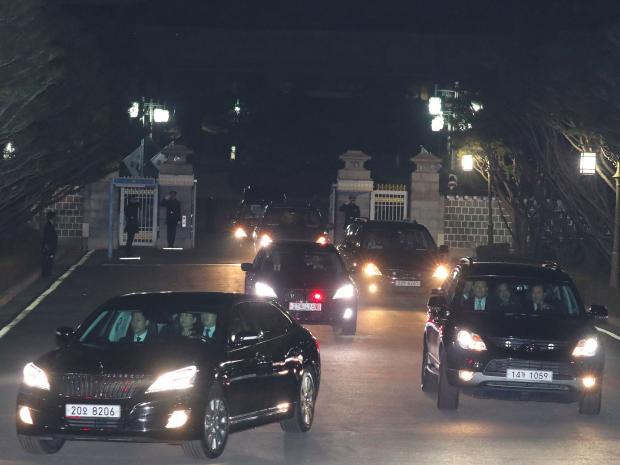South Korea’s Ousted President Park Leaves Blue House in Disgrace
The Constitutional Court formally removed Park from office on Friday, upholding an impeachment motion filed by lawmakers in December.
The 65-year-old daughter of a former dictator is the first democratically elected leader to be forced from office in South Korea.
Her departure from the presidential Blue House on Sunday evening came a day after tens of thousands of opponents and supporters divided the streets of downtown Seoul with massive rallies, reflecting a nation deeply split over its future.
Former President Park Geun-hye greets pro-Park politicians and supporters as she arrives at her private home in Seoul’s Gangnam district, March 12, two days after the Constitutional Court ruling upholding her impeachment.
Moody’s Investors Service said there is a number of domestic and external challenges to growth in South Korea, though it said it continues to forecast South Korea’s growth of 2.5 percent in 2017.
One expert explained that the North Korean government would have struggled to explain constitutionalism to its people – given Pyongyang’s less than conventional relationship with the rule of law. She could now face private prosecution.
Moon said it would be “heartless” to kick Park out of the Blue House while her home was being prepared but warned against possible attempts to destroy or remove state documents before she left.
Several parties, including conservatives scrambling to distance themselves from Park, say South Koreans should vote in a new constitution in addition to a new president in early May.
The impeachment has exposed divisions in a society in which politics is still partly framed by Cold War rivalry.
She released her first statement since her ouster, in which she apologized for failing to fulfill her duties as president.
On Friday, two Park supporters were killed as they tried to break through police lines outside the court, shortly after the verdict. Almost 20,000 police officers were deployed on Saturday to monitor the protesters, who were also separated by tight perimeters created by hundreds of police buses.
Some of Park’s supporters reacted with anger after the ruling, shouting and hitting police officers and reporters with plastic flag poles and steel ladders and climbing on police buses.
The Democratic Party’s Choo said Park should be treated as a suspect and cooperate with any investigation.
The frontrunner in the campaign for elections to replace Park, which must be held within 60 days, is Moon Jae-in, who favors engagement with North Korea over military threats and has said the decision to deploy THAAD should be reviewed.
The likely victor – by a distance – is the liberal former Democratic Party leader Moon Jae-In who enjoys 36 percent of popular support. She was accused of helping her friend Choi Soon-sil extract bribes from major companies, including Samsung, as well as leaking confidential documents to Choi.
Park and Choi each deny wrongdoing.
Although Roh’s suicide came amid bribery allegations he is still perceived by Koreans as being one of the cleanest politicians in their history. The rogue’s state’s latest missile tests coincide with the run-up to Park’s impeachment.








